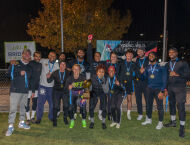Culture
 Cast of "Until the Flood" on their first day of rehearsals via Zoom. Still courtesy of Studio Theatre.
Cast of "Until the Flood" on their first day of rehearsals via Zoom. Still courtesy of Studio Theatre.
Studio Theatre on Reimagining Access to the Arts
March 12, 2021 @ 10:00am
“I always say I’m in the business of empathy.”
Reginald Douglas, associate director of Studio Theatre, is speaking about the importance of promoting inclusivity and diversity at the 14th Street Corridor space known for its contemporary works.
“My job is not to make pretty light cues and pretty musicals and good dance numbers and good acting alone,” he adds. “My job is to use those things to help someone feel [and think] differently about the world they live in [and] hope they better understand their neighbor, their community, their place in it, and their ability to empathize and connect with other people.”
Studio Theatre, like many other theatre institutions throughout the country, has had to sit with some tough decisions in the past year. On June 8, 2020, which also happened to be the day before George Floyd’s funeral, a group of BIPOC members of the theatre community released a statement: “We See You, White American Theatre (W.A.T.)” Signed by a group of 300, this statement was an eloquent grievance letter stating that American theatre had far too long been culturally insensitive and implemented exclusionary practices.
“We have watched you hire the first BIPOC artists in executive leadership, only to undermine our innovations and vision of creating equitable institutions by suffocating our efforts with your fear, inadequacy and mediocrity,” the statement reads.
Whoever wrote that deserves a forehead kiss. The letter goes deep, has range and requires action. On July 9, the BIPOC collective released a 31-page document called “BIPOC Demands for American Theatre.” That’s the date they gave the theatre industry homework, and institutions have had to get in line – or they have been called out.
The campaign even keeps an accountability report. If you go to the We See You W.A.T. collective’s website, there’s a link to download the seven-month accountability report. While their commitment to holding W.A.T. accountable has been unwavering, the report page uses some encouraging language: “Let this report show what collective action can do. You did this. This is your movement, and it is working.”
Studio Theatre sits on 14th Street Northwest at the corner of 14th and P, a major artery for the nation’s capital and one that has had a checkered past and metamorphosis. I had a unique experience chatting with members of Studio’s executive leadership, along with an actor in one of their productions, on their thoughts surrounding this moment. There’s so much “equity, diversity and inclusion” chatter out there today that I wanted to get an idea of what doing the work actually looks like, and who’s actually doing it.
David Muse just entered his 10th season as artistic director at Studio Theatre. I asked him how he approaches being supportive of the BIPOC community and presenting their works authentically at the theatre, even though their experiences may be different than his own.
“I think what you’ve done is put your finger on what is, for me, some of the most deeply challenging aspects of wrapping my head around some of this work I face personally,” he said. “I’m the guy who’s supposed to make the most major judgments about excellence and quality, and what we ought to be doing. How do you do that and help your institution turn into a more antiracist place, recognizing all the while that I am a white, heterosexual male who’s Ivy League-educated? I don’t have any glib answer to that question. It is deeply challenging, and it’s one that I think I’ll be engaging with for years and years.”
As he spoke, he wore an expression that made me genuinely feel how heavy these thoughts were in his mind. There are no guaranteed answers to these things. Some individuals or groups of individuals try their best, but what that attempt looks like is everything. If you are white in a leadership role at a performing arts institution in an urban area, and you aren’t struggling with, losing sleep over, or insecure about impact, direction or the message of your programming and whether or not you’re doing enough, it will show.
That’s what it’s going to take. It’s not going to be fun. It will be agitative, but if you are doing it with your best intentions, the journey will be rewarding. Muse emphasized that this isn’t a duty he runs from. He welcomes it, without resentment. He says growing up in a small town in the Midwest, he didn’t go to the theater to see individuals like himself onstage. Rather, he appreciated being exposed to different people and different ways of thinking.
Muse is a worker. He prefers to reserve his concerns for, “What will all of this mean for the art that’s on our stages? Let’s talk about the work.”
That’s where his excitement sits: in things to come.
“What are some of the ways in which we’re going to see aesthetic innovation?” he asks, and then leans into a metaphor he calls “deeply imperfect.”
His metaphor works, though.
“I think sometimes about American music: Try to imagine what American music would be like without the contribution of Black artists. One, it’s impossible. Two, it’s immeasurably less rich [without their contributions]. You couldn’t say the same thing at the moment about the American theatre, not quite. What if we imagine what all of this work is going to do for the enrichment of our art form? How about we get excited about that?”
Actress Felicia Curry, who is appearing in Studio’s upcoming production of “Until the Flood,” believes one point of focus for the industry and venues alike is audience diversity.
“[Theatre venues] should have a more diverse audience membership,” she says. “You do it for your shows that have Black actors or Black production teams, but you don’t do it for the rest of the season.”
Studio Theatre is working to expand audiences for every production.
One way the theater has put words to task is through a new partnership with DC Public Library, which allows those who “may not have the resources to see our work to see our work for free,” Douglas says.
“You can go to the library now and get a voucher that says, ‘Hey, Studio Theatre work is for all communities.’ That super increases our accessibility to reach all of D.C. and lets them know the work we make is for them.”
“Until the Flood,” which runs from April 16 to May 9, tells the story of a “cross-generational ensemble of three Black women” in the aftermath of Michael Brown being shot by police in Ferguson, Missouri. Written by Dael Orlandersmith and directed by Douglas, the play celebrates “the resolve for justice that remains as urgent today as it was seven years ago.” Curry plays a member of the ensemble in this earnest production.
“We are giving our audiences a chance to really see into the lives of these people whose shoes they don’t walk in so they can finally have a better understanding,” Curry says. “I won’t say a true understanding, but a better understanding. That, for me, is the basis of theatre. Theatre allows us to see stories that either mirror our own or stories of people, things and places that we don’t know, or that we can’t even imagine. [It] gives us an opportunity to understand and start to have questions, and that’s how we get to know each other better.”
For more on Studio Theatre and “Until the Flood,” visit www.studiotheatre.org and follow @Studio_Theatre on Twitter and @studiotheatre on Instagram. To learn more about the We See You, W.A.T. collective, visit www.weseeyouwat.com and follow @weseeyou_wat on Twitter and @weseeyouwat on Instagram.
Studio Theatre: 1501 14th St. NW, DC; 202-332-3300; www.studiotheatre.org
Enjoy this piece? Consider becoming a member for access to our premium digital content. Support local journalism and start your membership today.







